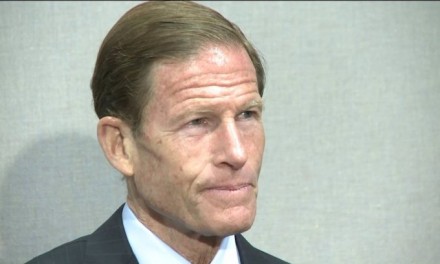We have groaned as a nation under judicial tyranny for a good part of our history. Unconscionable judicial activism has been particularly malignant over the last 70 years and the cancer has now metastasized to the point where our entire body politic is in terminal condition.
Judicial activism is like the weather. Everybody talks about it and everybody complains about it, but nobody does anything. Until now.
I have contended for years that the key to breaking the back of judicial tyranny is for the elected representatives of the people at the state level to rise up against an out-of-control Supreme Court and just say “No. Not gonna happen on our watch. Your ruling is unconstitutional, and because it is unconstitutional we have a sworn duty to reject it.”
A governor backed by a conservative state legislature could have done this the day the Obergefell decision was announced. Now while we haven’t yet found that kind of courage in a governor, even a conservative one, we have found that kind of courage in the Alabama Supreme Court. In particular, we find it in Chief Justice Roy Moore and associate justice Tom Parker.
Alabama’s state supreme court issued an order on March 4, 2015, prohibiting the recognition of same-sex marriage in Alabama. Using their statutory authority, the justices ordered probate judges not to issue any wedding licenses to same-sex couples in order to preserve the plain meaning and effect of the Alabama constitution. Last week they reaffirmed their own order in a final judgment. Same-sex marriage is illegal and unconstitutional in Alabama, Supreme Court or no.
The Court had recently ordered Alabama to violate its own constitution as well as the Constitution of the United States, and Chief Justice Moore said it was not going to happen on his watch.
In a forceful 170-page ruling, the Alabama Supreme Court rejected the Supreme Court’s opinion in Obergefell. (Note, by the way, that the Supreme Court issues “opinions,” not laws. It is impossible for a Supreme Court ruling to be the “law of the land” since the Court has no legislative power whatsoever according to Article I of the Constitution. Its opinions are binding on the plaintiffs before them but on no one else.)
The Alabama court declared that the same-sex opinion issued by the Supreme Court is “illegitimate,” and is wholly without legal or precedential authority. Said Judge Moore in his powerful 105-page concurring opinion, “the majority opinion in Obergefell has no basis in the law, history, or tradition of this country. Obergefell is an unconstitutional exercise of judicial authority that usurps the legislative prerogative of the states to regulate their own domestic policy.”
“[T]he majority opinion in Obergefell,” continued Moore, “is an act of raw power with no ascertainable foundation in the Constitution itself… [it] is a lawless act.” The Court had presumed to amend the Constitution by granting a right to same-sex marriage, a right that is nowhere found in the Constitution. The Supreme Court cannot amend the Constitution; the people alone have that power. “In short,” says Moore, “the majority acts not as a court of law but as a band of social revolutionaries.” The concept of judicial review, flawed to begin with, “has morphed into the right of five lawyers to rule the people without their consent.”
“The Court does not possess the authority to insert the amendment into the Constitution by the vehicle of a Court opinion and then to demand compliance with it.” Moore notes that the language ofObergefell is lofty and pretentious, a way of disguising its manifest deficiencies. As the late Justice Antonin Scalia wrote in his dissent, the majority had exchanged “disciplined legal reasoning” for “the mystical aphorisms of the fortune cookie.”
Moore notes that sodomy has historically been treated legally as “an infamous crime against nature.” Because of this incontrovertible fact of life, history, law, and nature, “Sodomy has never been and never will be an act by which a marriage can be consummated.”
The rejection of the laws of nature and nature’s God represented by the embrace of same-sex marriage is not only immoral but dangerous and destructive since it leads to gay adoptions which deliberately deprive a young child of either a mother or a father, something no rational society that cares about its most vulnerable citizens would ever do. “The great sufferers,” writes Moore,” will be the children — deprived of either a paternal or a maternal presence — who are raised in unnatural families that contradict the created order.”
Justice Moore then gets to the nub of the question: “If, as the Chief Justice asserts, the opinion of the majority is not based on the Constitution, do state judges have any obligation to obey that ruling? Does not their first duty lie to the Constitution?”
It is the Supreme Court of the United States which has violated the Constitution here, not the Supreme Court of Alabama. Alabama’s court is upholding the Constitution while the Supreme Court is shredding it. What Alabama’s justices are doing here is not engaging in civil disobedience but constitutional obedience of the highest order.
Moore observes as much when he says that allowing the Supreme Court to trample on the Constitution when the Alabama Supreme Court is in a position to do something about it “violates not only common sense but also our duty to the Constitution.” Moore points out that under Article VI of the Constitution, state judges are bound to obedience to the Constitution, “not to the opinions of the Supreme Court.”
Thus, he says quite pointedly, “I disagree with the conclusion that the ‘rule of law’ requires judges to follow as the ‘law of the land’ a precedent that is ‘a super-legislative imposition,’ ‘a mockery,’ ‘a legal fiction,’ and ‘an utter travesty.'” Alexander Hamilton pointed out that when the federal government invades the rights of states, such acts are “acts of usurpation.”
Moore echoes Hamilton when he writes, “If the Court’s edicts do not arise from powers delegated to the federal government in the Constitution, they are to be treated not as the supreme law of the land but as mere usurpation.” Consequently, “if precedents are ‘manifestly absurd or unjust,’ ‘contrary to reason,’ or ‘contrary to the divine law they are not to be followed.” Thus, the Obergefell decision “is not entitled to precedential value.”
Moore points out that there is also the matter of his own oath of office and his solemn duty to fulfill it. “If, as an individual who is sworn to uphold and support the United States Constitution, I were to place a court opinion that manifestly and palpably violates the United States Constitution above my loyalty to that Constitution, I would betray my oath and blatantly disregard the Constitution I am sworn to uphold. Acquiescence on my part to acts of ‘palpable illegality’ would be an admission that we are governed by the rule of man and not by the rule of law. Simply put, the Justices of the Supreme Court, like every American soldier, are under the Constitution, not above it.”
Blind adherence to Court opinions, says Moore, is a “dangerous fallacy,” and to label such opinions as the law of the land “confuses the law itself — the Constitution — with an opinion that purports to interpret (it)”. Lincoln himself accepted the horrific Dred Scott decision as reaching only to the plaintiffs before the Court — Dred Scott and his slave owner — but he refused to accept that it had any precedential force for the rest of the Union.
From a strictly legal point, Moore points out, Alabama was not a party to the Obergefell case, and therefore can’t be subject to its ruling. “[T]he Court had no jurisdiction to order nonparties to Obergefellto obey its judgment for they have not had an opportunity to appear and defend.” Thus, “the judgment in Obergefell that reversed the Sixth Circuit’s judgment does not constitute an order to Alabama probate judges.”
“Obergefell is completely without constitutional authority, a usurpation of state sovereignty, and an effort to impose the will of “five lawyers,” … on the people of this country.” Because it is “an immoral, unconstitutional, and tyrannical opinion,” the highest court in Alabama has a solemn and sacred duty to refuse to enforce it.
The Supreme Court Justices are no less subject to the Constitution than are state judges. They are not supreme over the Constitution, but under its authority. Thus, “when that ’eminent tribunal’ unquestionably violates the limitations set forth in that document, lesser officials — equally bound by oath to the Constitution — have a duty to recognize that fact or become guilty of the same transgression.” As Moore’s colleague on the Alabama bench, Tom Parker put it: “As justices and judges on state courts around the nation, we have sworn an oath to uphold the United States Constitution. We have not sworn to blindly follow the unsubstantiated opinion of ‘five lawyers.'”
Justice Roy Moore and the Alabama Supreme Court have done the nation a historic service here. We have been mired in a bog of liberty-suffocating judicial tyranny for decades and they have shown us the way to freedom and the restoration of a constitutional republic. If other elected officials in other states will follow their shining example, we may soon find ourselves back in the “sunlit uplands” our Founders walked. Not to stand with Justice Moore is to sink further into the swamp and lose our political breath and indeed our political life.
Here’s how Mat Staver of Liberty Counsel put it: “The people must now decide if we are governed by the rule of law or the whim of unelected judges.” I don’t know about you, but count me in for Justice Roy Moore and the rule of law. May his tribe increase. Rapidly and soon.
Bryan Fischer hosts “Focal Point with Bryan Fischer” every weekday on AFR Talk (American Family Radio) from 1:00 – 3:00 p.m. (Central).



















Recent Comments